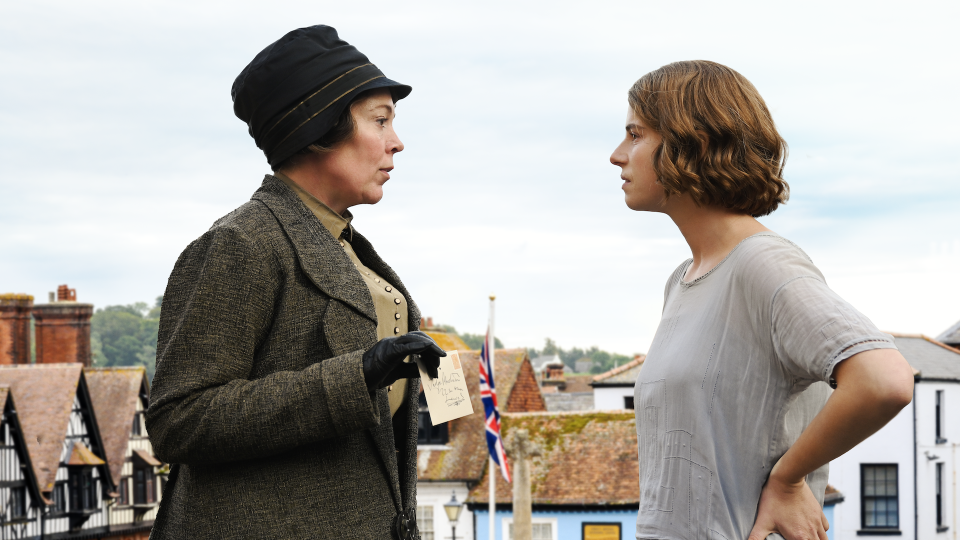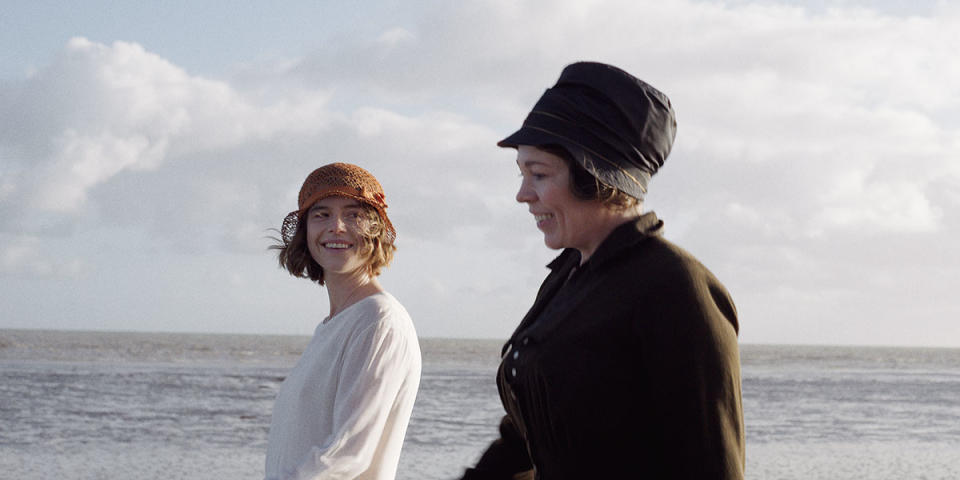How Rookie Screenwriter Jonny Sweet’s Profane ‘Wicked Little Letters’ Lured Olivia Colman

There’s a reason “Wicked Little Letters” (Sony Pictures Classics, March 29) lured the A-list cast that British comedian and TV scribe Jonny Sweet (“Chickens”) and theater/film director Thea Sharrock (“The Hollow Crown”) dreamed about, including Olivia Colman and Jessie Buckley.
Sweet pitched the idea to StudioCanal’s Nicola Shindler, who took him on as a film writer even though he’d only done TV. His first movie script was so funny that when Shindler sent it to Colman, the Oscar-winner (“The Favourite”) signed on right away to play Edith, a proper village spinster living at home who goes to the police after receiving a series of scatologically creative hate letters in the post. Who could resist language like “you foxy-ass piss-country whore?” (“That’s an absolute copper-bottom real quotation,” said Sweet.)
More from IndieWire
The 12 Best Thrillers Streaming on Netflix in April, from 'Fair Play' to 'Emily the Criminal'
Olivia Colman and Benedict Cumberbatch to Lead 'War of the Roses' Remake
That got the ball rolling: Soon, Timothy Spall joined the cast as Edith’s misogynistic father, steeped in old-school patriarchal ways, along with Jessie Buckley as Rose, Edith’s brash, Irish, heavy-drinking, single mom next-door and chief poison-pen suspect.
The movie offers a mystery to be solved, to be sure, and an entertaining character study of what repression can yield, but it’s also overtly feminist, as a bevy of village women led by Eileen Atkins gang together to free Rose from jail (despite the best efforts of the police and courts to keep her there) and find the real culprit.
After launching his career as a writer-comedian with Cambridge’s Footlights Review, Sweet kept creating characters for himself to perform, then moved on to sitcoms. “I always felt it wasn’t quite the perfect fit,” he told IndieWire on Zoom. “For me, I wanted to tell stories that were funny, and entertaining, but also were real stories that had some substance to them, and were about desperate characters. They were propulsive and they meant something to me.”
Obsessed by reading histories of ordinary people, Sweet came upon the true story of the Littlehampton poison-pen letters scandal. “I was blown away by it,” he said. “I remember reading the story and feeling a rush of adrenaline that it was just what I was looking for. It was all there. I’ve obviously embellished it here and there, but the most idiosyncratic elements of it are original. And it was a story about language, how we use it, what it means, how we wield power with it, and how we curb people’s power and their freedoms with it. When I read the letters, I felt there was a fascinating character who was writing them, who was a child still, but also viciously angry, who was very repressed. And clearly was venting something quite potent through these anonymous letters. Then, the story itself was just a complete rollercoaster, and it ended with a classic, cinematic sting operation.”

A fan of Ealing comedies, Sweet also liked the working class energy with “lots of swearing in it,” he said. “And it’s about women, who got the vote about a year before this film. They can’t go to the pub, and they can’t talk the way they’d like to. And they certainly can’t have wet hair on the Sabbath, without going to jail, essentially. So all of that was unbelievably rich, but also silly. And dark.”
It’s hard to believe that this outrageous story could be true, but Sweet said that the historian on the film, Emily Cockayne, told him it was “incredibly accurate.” He swears that while he made the characters a tad more sympathetic, didn’t have the letters signed by Rose, and added a few of his own jokes, along with the ad-libbing Colman, most of it is real. (“You big fucking onion!” is his line, along with, “Call that a chin? There’s nothing fucking there!”) “I did maintain the petty tone and the spirit of [the letters]. And the key ones are real.”

In real life, the scandal “went all the way to the House [of Commons] and was debated in Parliament,” said Sharrock. “It was all across the news, both the wireless and broadsheets. The three main characters are absolutely true. There are also some crazy details like the invisible ink. That is completely true. I love it. Somebody was hiding in a postbox? Completely true.”
Theater, television, and film veteran Sharrock (“Me Before You”) came on board (this is her fourth film) to capture the nuances of the feminist comedy. At first, she welcomes the viewer into a familiar period milieu. “It was important to set up a world that felt harmonious and recognizable and easy. All of it says, ‘British small town, countryside.'”
Then, she hits you with the reading of the letters to the cops. There was never a conversation about updating the story. “By setting it 100 years ago, but being careful with the aesthetic choices,” said Sharrock, “I wanted the world, the hair and makeup, the costumes to feel as though it’s a period piece, but there is always a level of modernity. So we’re constantly, whether we’re conscious of it, making the comparison from then to now. If we had simply set it in today, you would never have done that.”
The trick was taking a laugh-out-loud script and maintaining the balance with the story’s darker elements. “The biggest challenge,” said Sharrock, “was getting the balance of the tone, because I felt in the script, it was innately there, that on the one hand, it’s funny. At the same time, there are big important issues in there that need to be dealt with carefully so that you maintain that balance, and that it stays light enough to be entertaining. I didn’t want it to be a big heavy piece. I wanted it to be a fun ride.”
Colman understood the underpinnings of Edith. “She felt real empathy towards Edith and she found her story hilarious,” said Sharrock. “But also what’s really going on, what’s really ticking and how much pain this woman is in, and the repression. The woman is nearly 50, and she’s still living at home. She has never experienced anything outside. And there is a part of her that reverts back to being eight years old, when her father speaks to her in a certain way. Olivia is such an instinctive and accessible actress. She makes it so easy for you to lean in and just be with her that it allows you to feel warmth about somebody who, in the wrong hands, you could want real distance from. But with Olivia, you want to get closer and to understand her, whoever it is she’s playing.”
Next up: Sharrock shot a movie before “Wicked Little Letters” that is coming out on the same day, “The Beautiful Game” (Netflix), starring Bill Nighy. While she loves directing movies and reaching a wider audience, she’s hoping to go back to her first love, theater, soon.
Sweet’s not only lining up new jobs and doing unaccustomed publicity tours for his first movie, but his first novel as well, “The Kellerby Code” (available in the UK). “I’m telling the sorts of stories,” he said, “that I probably was apprenticing myself to be able to tell. It’s been a little much [exposure] for me. I’m used to just being on my laptop. It’s stressful.”
“Wicked Little Letters” is now in select theaters from Sony Pictures Classics.
Best of IndieWire
The 12 Best Thrillers Streaming on Netflix in April, from 'Fair Play' to 'Emily the Criminal'
Quentin Tarantino's Favorite Movies: 61 Films the Director Wants You to See
Sign up for Indiewire's Newsletter. For the latest news, follow us on Facebook, Twitter, and Instagram.


